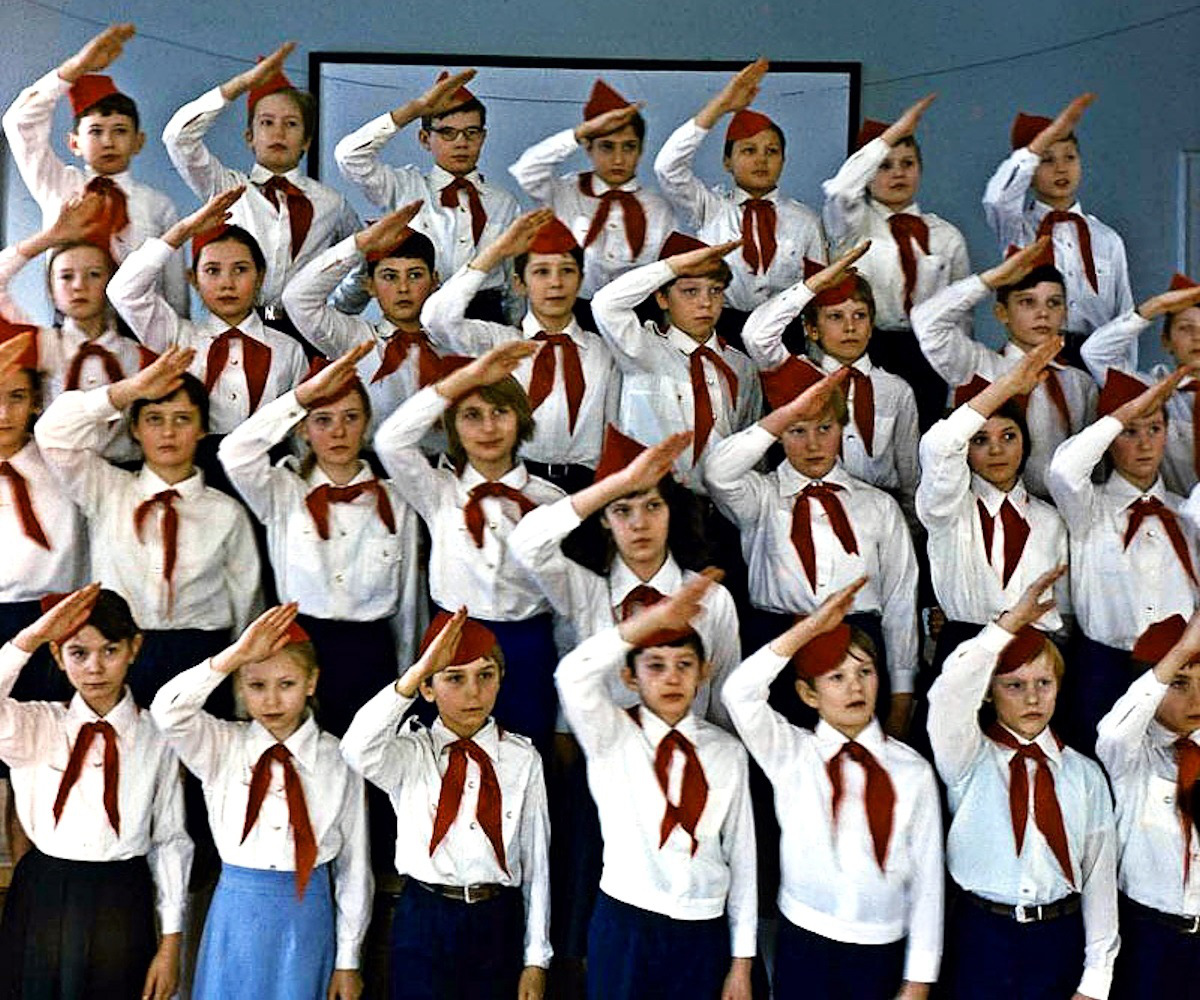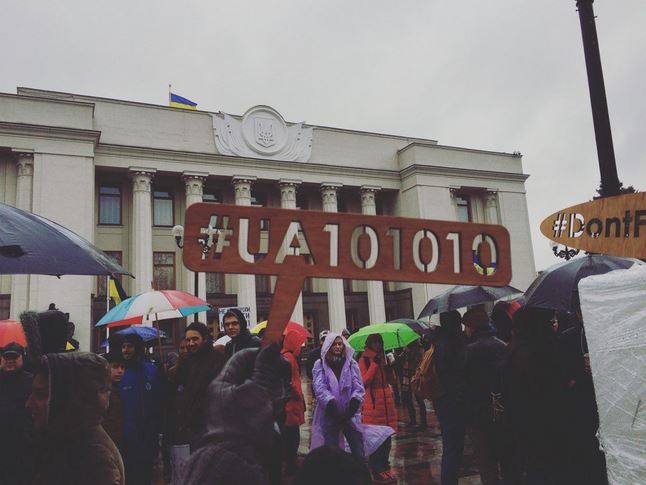During two months or so, we spread lots of appeals to the Dutch to vote “yes” in the upcoming referendum. There were the leaders of Ukraine’s national minorities, a Russian diplomat and Russian intellectuals, a Ukrainian journalist, the Ukrainian Jewish community and LGBT organizations, the Ukrainian PEN club, civic society, and more than Soviet 80 political prisoners that appealed to the Dutch to vote “yes.” There were the businessmen that told how much a deal that’s 95% about trade would be beneficial for our countries. I was very much interested in how people in The Netherlands would react. Many of you answered that you will still vote “no,” because you know what’s better for Ukraine, and that you are doing us a favor by keeping us away from the totalitarian EU.
I appreciate that you took the time to consider what is better for Ukraine in this deal. But I’m afraid we have different understandings of totalitarianism.
Did you ever wonder why people from post-Soviet states look so sad?
Perhaps some of you visited Ukraine or some other post-Soviet country. You may have noticed that people smile a lot less than in your home country. It’s not only because they are poorer. It’s because they are living in a post-totalitarian society, in which citizens were denied of the right to speak, act, and even think freely. In the USSR, if someone dared to criticize the government as you now criticize the EU, they would be either dead or with a life sentence in a Siberian prison camp. Every person born on Soviet grounds was to become a well-behaved, emotionless, thoughtless cog in the machine, or not exist at all. You had a choice to either eat or be eaten. If you didn’t snitch on someone, someone would snitch on you and send you to the Gulag.

During 70 years of totalitarian Soviet rule, every fourth representative of my nation was repressed. In the 1930’s, 7 million (yes, you read it right, 7 MILLION) were starved in a genocidal famine, the Holodomor. The cultural figures and elites of my nation were either killed or shunned in the Executed Renaissance. The ones that dared speak up in the 1960s, the “Sixtiers,” were sent to Siberia.
The result of living in a totalitarian country is a society where people do not know how to stand up for their rights. They don’t even know they have them. As a result, those in power can abuse it and use public money for corrupt causes. This happens everywhere where society can’t organize itself to keep those in power in check. Perhaps you know of a person that was abused in childhood? That’s how totalitarianism impacted four generations of Ukrainians. That’s what the younger generation of Ukrainians are trying to change.
Read also: How Ukraine got into such bad shape
Now, slowly, Ukrainians are learning to live in a democratic society
The 25 years that passed after the USSR fell apart demonstrate so well how difficult it is to transition from slavery to freedom. Much of the power and wealth in our country is controlled by a small group of people who function according to the undemocratic rules of the Soviet era, which leave no room for individual freedom or dignity. This leads to a life of misery. In the Euromaidan revolution of 2013-2014, we said that we had enough and sent a pro-Russian, corrupt puppet of a president fleeing. For this, we were attacked by Russia, which first occupied the Ukrainian peninsula of Crimea, and is waging a “war by any other name” in eastern Ukraine. Now a small sliver of active civil society that has been abroad and knows how a democratic society functions are trying to change the old system. They are active in creating independent media, NGOs, reforms, they are entering politics. And it’s very, very difficult.
Read also: A year of reforms in Ukraine. The best, the worst, and why they are so slow
Cooperation with the EU is crucial for the democratic transformation of Ukraine
Though it may not seem obvious at first glance, any sort of cooperation with the EU is crucial for Ukraine’s civic society. I will explain on the example of the EU-Ukraine visa liberalization laws, which, contrary to what many may think, are not in any way connected to the Association Agreement.
Eurointegration is one of the main priorities of Ukrainians nowadays, all across the country. It is a symbol of the dignity and freedom that hundreds of Euromaidan protesters died for in my capital. The visa liberalization process, as any other agreement of the EU with Ukraine, sets requirements that Ukraine enacts democratic reforms which are hated by our power-wielding elites, because they lead to the destruction of their cash flows.

Every time the Ukrainian elites tried to sabotage the reforms, our civic society appealed to foreign political actors to reprimand the Ukrainian elites and suspend further steps toward eurointegration. The reprimands acted very negatively on the domestic popularity of the elites, because Ukrainians want to live in the democratic society that is embodied by European values, and because it is for this dream that they died in the center of my capital during Euromaidan. In this way, step by step, Ukrainian civil society, with the help of external political processes, pressured the elites to adopt legislature that is essential to the democratic transformation of Ukraine. Thanks to the pressure that the visa liberalization process provided, we now have a National Agency for Preventing Corruption, a revolutionary civil service law, and we adopted anti-discrimination amendments into our work code.
Read also: Behind the scenes of civic society’s battle with corruption in Ukraine
And the EU-Ukraine Association Agreement plays a fundamental role
95% of the text of the agreement is dedicated to trade and economic cooperation. Right now, Ukrainian exports are split approximately in half between Russia and the EU. The economic cooperation with Russia has always been close because of the economic noose tying together all the economy of the former Soviet countries, based on limitless Russian carbon fuel. The EU-Ukraine Association agreement will give a chance for us to modernize our Soviet production and enter the world market. It will also give EU citizens many investment opportunities in Ukraine. Both sides will profit from lifting of trade barriers.

Read more: The Association Agreement, Ukraine and the EU: A Marriage Contract in Pictures
The other 5% of the text is dedicated to the common democratic values that Ukraine and the EU share, the political dialogue and reforms, cooperation in defense, justice, freedom, safety, finances, and the fight against corruption. Every chapter of the Agreement requires that Ukraine amends its legislature to conform it to EU norms. Each of these amendments brings Ukraine closer to democracy and gives power to Ukrainian civil society to control their authorities.
Now here is the important part. With the Agreement, Ukraine gets a very important incentive for carrying out essential reforms – access to the EU market. No less important are the reprimands that EU partners will hand out to Ukrainian authorities for violating the agreement. The implementation of the Agreement may be stopped altogether if Ukraine starts violating human rights and freedoms and rule of law.
Imagine how Ukrainian society will get angry if that happens. This means that the Agreement is giving an absolutely essential tool to Ukrainian civil society to transform their society.
Whether they get this tool, or a hard kick, depends on the Dutch voters on 6 April 2016.




